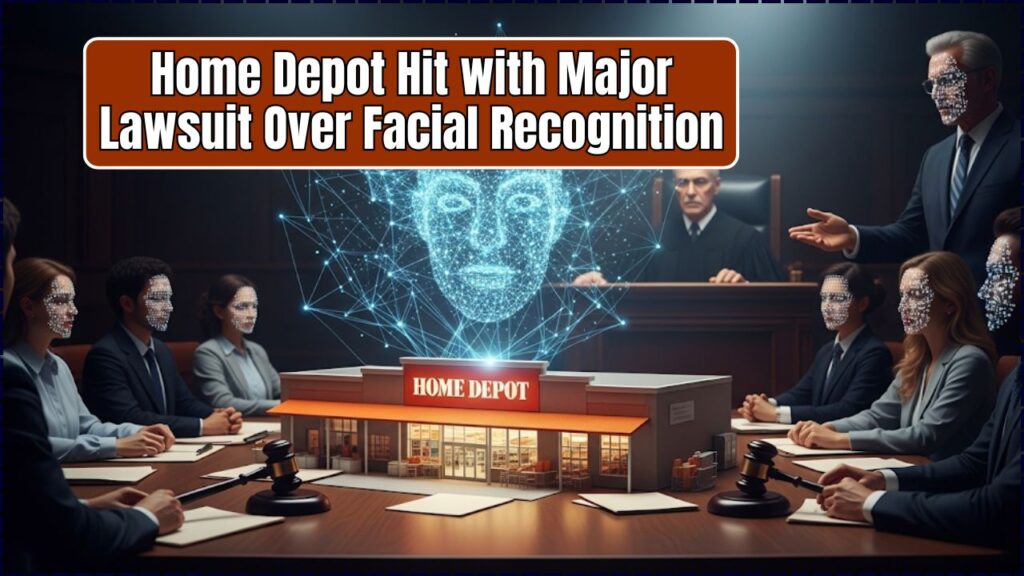When you walk into a store, you expect cameras in the ceiling, maybe a security guard near the door, and the usual checkout process. What you don’t expect is a computer secretly scanning your face while you’re just trying to buy a hammer. But that’s exactly what a new lawsuit claims: Home Depot hit with a major lawsuit over facial recognition is the talk of the nation.

A Chicago man says the home improvement giant used AI-powered facial recognition at self-checkout kiosks without telling anyone. And in Illinois, where privacy law is no joke, that could mean serious consequences—not just for Home Depot, but for retailers across America.
Home Depot Hit with Major Lawsuit Over Facial Recognition
| Category | Details |
|---|---|
| Who Filed the Case? | Benjamin Jankowski, Chicago resident |
| Filed Date | August 1, 2025 |
| Allegations | Secret facial recognition at self-checkout kiosks without notice or consent |
| Law Involved | Illinois Biometric Information Privacy Act (BIPA) |
| Possible Damages | Up to $1,000 negligent / $5,000 reckless per violation |
| Stores Impacted | 76 Home Depot locations in Illinois |
| Home Depot’s Response | No public comment |
The lawsuit against Home Depot isn’t just about checkout kiosks—it’s about privacy, trust, and the future of shopping. Technology is powerful, but it needs rules. Whether you’re a customer wanting peace of mind or a business trying to innovate, the message is clear: consent isn’t optional.
For shoppers: know your rights. For businesses: be transparent. Because in 2025, trust is the real currency.
What Exactly Happened?
Benjamin Jankowski says that during a late June trip to Home Depot, he noticed a strange green box framing his face on the self-checkout screen. It wasn’t a glitch—it was computer vision software, a form of facial recognition.
The lawsuit claims that Home Depot was quietly recording customers’ facial geometry without asking for consent. Think of it like someone making a copy of your fingerprint without telling you. Under Illinois law, that’s a big problem.
Why This Lawsuit Matters
Illinois’ Tough Privacy Law
Illinois leads the nation in biometric privacy protections. Its Biometric Information Privacy Act (BIPA) requires businesses to:
- Get written consent before collecting biometric data.
- Publish a clear retention/destruction policy.
- Handle data responsibly, without surprises.
Here’s the kicker: even if the data isn’t stolen or sold, a company can still be sued just for skipping the paperwork.
Real Dollars at Stake
Violations aren’t cheap. BIPA sets damages at:
- $1,000 for negligent violations
- $5,000 for reckless/intentional violations
Multiply that across thousands of Illinois shoppers, and Home Depot could face a bill in the millions. For context, Facebook coughed up $650 million in 2020 for a similar case.
Data Privacy Laws
| Feature | Illinois BIPA (Biometric Information Privacy Act) | General Data Protection Regulation (GDPR) |
| Type of Data | Biometric data (facial scans, fingerprints, etc.) | All personal data (name, email, IP address, etc.) |
| Who it Protects | Illinois residents | European Union residents |
| Key Requirement | Must obtain written consent before collection and have a public retention policy. | Must obtain clear consent for data processing and respect a “right to be forgotten.” |
| Legal Action | Allows private citizens to sue for damages. | Enforced by a supervisory authority, with massive fines for non-compliance. |
Facial Recognition in Everyday Life
Facial recognition isn’t science fiction anymore—it’s everywhere:
- iPhones and Androids use it to unlock phones.
- Airports scan travelers for faster boarding.
- Sports stadiums test it for ticketless entry.
- Police departments use it for investigations.
The difference? In most cases, you know it’s happening and you choose to participate. You want Face ID? You set it up. But with Home Depot, the claim is that you didn’t get that choice.
A Little History: Other Biometric Cases
Home Depot isn’t the first company to get caught in the BIPA net. A few examples:
- Facebook (2020): Paid $650M for auto-tagging photos without consent.
- Clearview AI (2022): Sued for scraping billions of online photos to build a face database.
- Google (2019): Sued for storing face scans from Google Photos without permission.
Illinois courts have been consistent: if you don’t follow the rules, you pay up.
Why Customers Are Shocked
Shoppers don’t expect their faces to be scanned at the hardware store. It feels sneaky. Imagine you hand over your driver’s license for an age check, and the cashier secretly copies it for later. That’s the vibe this lawsuit gives.
Trust is already shaky. A 2023 Pew Research study found 62% of Americans believe companies collect too much personal data. Add secret face-scanning into the mix, and customers feel even more exposed.
Industry Reactions: Safety vs. Privacy
Retailers argue facial recognition helps fight theft, which costs U.S. retailers nearly $100 billion annually. But privacy advocates say it’s like killing a fly with a cannon.
“Technology like this is powerful, but it needs transparency and consent,” says a privacy lawyer from Chicago. “Otherwise, it turns a shopping trip into a surveillance nightmare.”
Practical Advice for Shoppers
Spotting Facial Recognition in Stores
- Look for green or red boxes around your face on kiosks.
- Check for posted signs near self-checkouts.
- Ask employees—but not all will know.
What You Can Do If Concerned
- Know your rights. Illinois, Texas, and Washington have biometric laws.
- Opt for human checkout. Skip self-checkout if you suspect scanning.
- Report it. If you feel your rights were violated, contact a consumer protection lawyer.
Practical Advice for Businesses
If you’re a retailer or manager, this lawsuit is a wake-up call:
- Check state laws before deploying tech.
- Always get written consent. No shortcuts.
- Post clear signage. Customers respect transparency.
- Limit retention. Don’t hoard biometric data.
- Work with attorneys. Compliance is cheaper than lawsuits.
Future Outlook
This case could set a national precedent. Right now, only a few states have strict biometric privacy laws. But if Home Depot loses big, expect pressure for federal regulation.
Experts predict new rules requiring:
- Consent nationwide
- Federal enforcement agencies overseeing compliance
- Hefty fines for violations
In short: the future of retail tech might depend on how this one lawsuit plays out.
Top 3 Myths About Facial Recognition in Retail
- Myth: “It’s harmless, it’s just a security camera.”
- Reality: Traditional security cameras capture video, but facial recognition software analyzes that video to create a unique digital map of your face. It’s a key difference between passive observation and active data collection.
- Myth: “It’s only used on people who look like they’re going to steal.”
- Reality: The technology often works indiscriminately, scanning every person who passes in front of the camera, regardless of their behavior. The lawsuit alleges this data was collected from a regular, non-suspicious shopper.
- Myth: “You can just get a new face if your data is stolen.”
- Reality: Unlike a credit card number or a password, your biometric data is permanent. Once it’s captured and potentially exposed in a data breach, you can’t change it, making it a high-value target for hackers.
Real-World Case Study or Mini Example
- Meet Ben. Ben, a regular Home Depot shopper, went to his local store in Chicago to grab some paint. As he used the self-checkout, he saw a green box appear around his face on a small screen above the register. He’d seen cameras before, but this was different. There were no signs warning him about the technology, and no one asked for his permission. Curious, he snapped a photo. This simple observation led to him becoming the named plaintiff in a major class-action lawsuit, all because he felt his privacy was violated and he hadn’t been given the choice to consent.
FAQs
Q: Is facial recognition illegal in stores?
A: Not everywhere. But in Illinois, it’s illegal without written consent.
Q: Can I sue if my face is scanned without permission?
A: Yes, if your state has laws like Illinois’ BIPA.
Q: Did Home Depot admit to using facial recognition?
A: They’ve declined to comment so far.
Q: Will this spread beyond Illinois?
A: Likely yes—if Illinois courts rule against Home Depot, other states will see copycat lawsuits.








